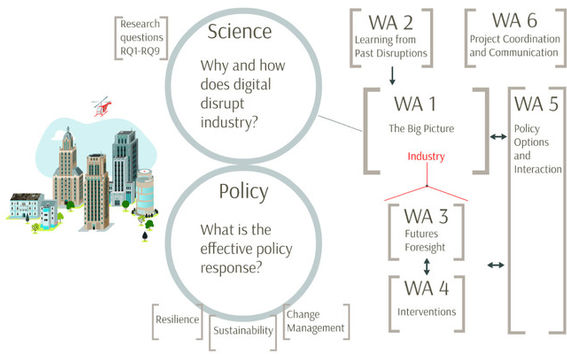The digital revolution in the industry and the society

Digitalization will have a profound effect on the whole society – industry, traffic, health and wellbeing, labor market and services in the society. The DDI project directed by Professor Martti Mäntylä aims to prevent the unwanted splitting of the society caused by digitalization. The budget of the project is 3.7 million euros and it will last for five years.
- Scalability and standardization of ICT platforms have narrowed the gap between supply and demand. In general applying information technology has become easier and cheaper. The amount of digital products and services will explode, and data derived from them can be utilized extensively, states Mäntylä.
The DDI project focuses on the digitalization of the industry – it is expected to transform thoroughly. The industry may gain cost reductions and increased efficiency. In addition, new business models may open up as data can be processed and merged with information from other systems.
- For instance ships hardly ever sail at the speed they were designed for. In the future the systems of the ships will be connected to weather forecasts, the load information of the harbors and the world market fuel price. Then both the system and the ships can be driven smarter. As the ship designers start to receive more accurate information on the real use of the ships, they can improve the design of the ships already in the initial phases of the process, says Mäntylä.
Digitalization demands new kinds of cooperation and sharing of data. Legal aspects such as consumer rights protection, allocation of responsibility and risks between different parties, ownership and data pricing must be considered. The new situation requires legal changes in Finland and in the EU.
- Roles of the products will change - they will be more like services. Thus even the role of the customers will change. They will pay for the added value of using the product instead of the product itself. That changes money flows, Mäntylä adds.
Keeping the change in control
- Even labor market will go through a drastic change. Plenty of professions will disappear and new ones will bring about. Some of the jobs will be enhanced due to the development of systems, while others will diminish or disappear as the digitalization progresses. In this project we investigate both the new skills that will be required and the measures in the labor market that help to keep the change in control, describes Mäntylä.
Research methods include for instance interviews of some key people, workshops and brainstorm meetings. The project does not include direct industry partners, as all involved companies will be treated equally. Companies will still be largely invited to participate either directly or through various organizations. For instance business models may be identified in the course of the project. When this happens, companies can be brought together to carry out a common concept, and even training materials can be included.
- The digital transformation is expected to affect even the values of the Finnish society. In this project we will discuss how transparency and equality can be maintained also in the future. Success of this project can be measured in terms of the success of the whole Finnish society. The goal of this project is to have the thought leadership in the societal discussion related to digitalization, concludes Mäntylä.
The DDI project includes ten research groups from the School of Science, the School of Engineering and the School of Electrical Engineering at the Aalto University, Lappeenranta University of Technology, University of Turku, VTT and ETLA.
More information:
Martti Mäntylä
Martti.mantyla@aalto.fi
tel. +358 50 3512 160
Read more news

Significant donation to boost pavement engineering research and education
Companies and associations in the field have donated €400,000 to the School of Engineering.
Design strengthens industrial competitiveness – human-centered factory work at the core
Factory work is undergoing a transformation: new technologies and artificial intelligence are changing the content and roles of work. Aalto University’s Department of Design is studying this change from a human-centered perspective in the HiFive project.
Learning to slow down: cold-water swimming benefits explored in new study
Swimming in cold water offers a temporal slowdown, promoting stress management and mental clarity that lingers long after the experience, says research from Finland.






